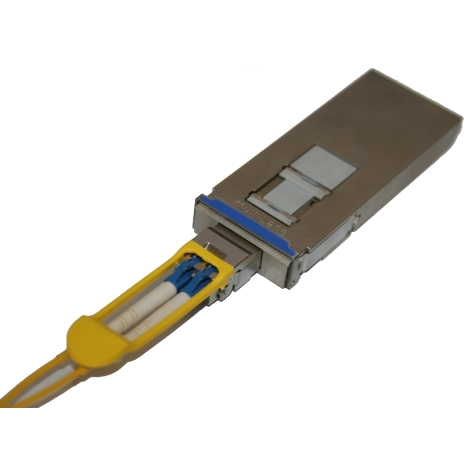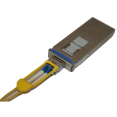The ML4086 is designed as a CFP2 to QSFP28 interconnect adapter housed in a CFP2 form factor, including a MSA compliant hardware and management interface implementation making it compatible with standard CFP2 Host ports . At the QSFP28 side, the adapter will provide a standard QSFP28 Host connector: implementing a SFF compliant driver which will be capable of operating standard QSFP28 transceivers.
The adapter will be MSA compliant and will recognized or detected by CFP2 hosts as a standard CFP2 module. At the same time, it will be supporting all required functions and features of a QSFP28 Host in order to drive QSFP28 transceivers. The latter will allow it to be used in system deployment applications where links are to be issued between line cards implementing CFP2 sockets and other cards implementing QSFP28 sockets.
The current version of the adapter will be un-retimed. Passive traces will route the 4x28G high speed signals between the CFP2 and QSFP28 connectors. Signal integrity will be optimized for the loss budget to meet the required Host to module and module to Host electrical specifications.
CFP2 management interface will provide a transparent way to access the QSFP28 module. QSFP28 registers may be mapped to CFP2 memory, an MDIO to I2C bridge allows R/W operations through a QSFP28 Two-Wire Bus Interface. Access to QSFP 28 Low speed electrical signals is provided through MDIO registers.
The QSFP28 Host side of the adapter will allow for hot plug of the QSFP28 module while preventing inrush current violations of the CFP2 standards.
The adapter will be housed in a CFP2 form factor which can host a QSFP28 pluggable transceiver. The latching mechanism allows the adapter to lock to standard CFP2 cages while the integrated QSFP cage placed inside the adapter will allow the plugged QSFP28 shell to lock inside it. The QSFP28 module will make contact with a flat top riding heat sink which rises from the adapter shell. This contact with the CFP2 heat sink allows the heat dissipation from the QSFP28 module by conduction through the CFP2 cage heat sink.


